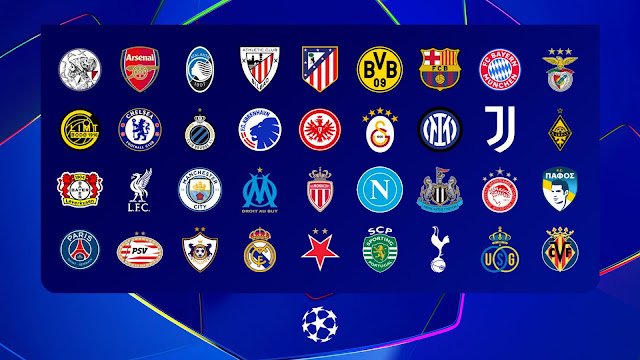The draw for the 2025/26 UEFA Champions League league phase has been unveiled, ushering in an exciting chapter for Europe’s premier club football competition. With 36 teams participating in the revamped format, the tournament promises a thrilling blend of high-stakes matches, new rivalries, and intense competition. Following the successful introduction of the League Phase format last season, the 2025/26 campaign will continue to embrace this innovative structure, with each team facing eight different opponents—four at home and four away—in a bid to secure a spot in the knockout stages. This article explores the details of the draw, focusing on the matchups for English teams, the implications of the new format, and the broader context of the Champions League as it evolves to meet the demands of modern football.
The New Champions League Format
The Champions League has undergone a significant transformation with the adoption of the League Phase, a format first introduced in the 2024/25 season and now cemented as a cornerstone of the competition. Unlike the traditional group stage, which featured eight groups of four teams, the League Phase expands the competition to include 36 teams in a single league table. Each team plays eight matches against eight different opponents, with the fixtures evenly split between home and away games. This ensures a diverse range of matchups, allowing fans to witness clashes between top clubs that might not have occurred in the previous format.
The qualification process for the knockout stages is equally innovative. The top eight teams in the league table at the end of the League Phase advance directly to the round of 16. Teams finishing from ninth to 24th place enter a two-legged play-off to determine the remaining eight spots in the last 16. Teams ranked 25th or lower are eliminated from the competition, with no opportunity to drop into the Europa League, as was the case in previous formats. This structure increases the stakes for every match, as teams must accumulate points consistently to secure a favorable position in the standings.
The expanded format has sparked debate among fans, players, and pundits. Supporters of the change argue that it creates a more dynamic and competitive tournament, with a greater variety of fixtures and increased opportunities for smaller clubs to compete against Europe’s elite. Critics, however, express concerns about fixture congestion and the physical toll on players, particularly given the already crowded schedules in domestic leagues and other competitions. Nevertheless, the League Phase has injected fresh excitement into the Champions League, and the 2025/26 draw has set the stage for a season of drama and intrigue.
English Teams in the Spotlight
English football continues to be a dominant force in the Champions League, with six Premier League clubs—Manchester City, Liverpool, Arsenal, Tottenham, Chelsea, and Newcastle—securing spots in the 2025/26 League Phase. The draw has delivered a mix of challenging and intriguing fixtures for these teams, pitting them against some of Europe’s biggest clubs as well as emerging talents. Below is a detailed breakdown of the matchups for each English side, highlighting the key battles and potential pitfalls.
Manchester City
Manchester City, the reigning Premier League champions and perennial contenders in the Champions League, face a formidable set of fixtures:
Borussia Dortmund (H): A clash with the German powerhouse, known for their attacking flair and passionate home support.
Real Madrid (A): A blockbuster encounter against the record 15-time Champions League winners, who remain a formidable force despite their aging squad.
Bayer Leverkusen (H): A matchup with Xabi Alonso’s dynamic side, which won the Bundesliga in 2024 and continues to impress in Europe.
Villarreal (A): A trip to Spain to face the Yellow Submarine, a team with a history of upsetting bigger clubs in European competitions.
Napoli (H): A chance to host the Italian champions, known for their high-pressing style and attacking prowess.
Bodo/Glimt (A): A challenging away trip to Norway to face the Arctic Circle club, which has become a surprise package in recent European campaigns.
Galatasaray (H): A home game against the Turkish giants, whose passionate fans and talented squad make them a tough opponent.
Monaco (A): A visit to the Principality to face a resurgent Monaco side, known for their fast-paced, attacking football.
City’s draw is a mix of high-profile clashes and potentially tricky away trips, particularly to Real Madrid and Bodo/Glimt. Pep Guardiola’s side will need to leverage their depth and tactical nous to navigate this challenging schedule.
Liverpool
Liverpool, under new management following Jurgen Klopp’s departure, are eager to reassert their dominance in Europe. Their fixtures include:
Real Madrid (H): A chance to host the Spanish giants at Anfield, where the atmosphere could prove decisive.
Inter Milan (A): A tough trip to Italy to face the Serie A champions, known for their defensive solidity and counter-attacking threat.
Atletico Madrid (H): A home clash with Diego Simeone’s resilient side, which thrives in European competitions.
Eintracht Frankfurt (A): A visit to Germany to face a team with a strong home record and a knack for upsetting bigger clubs.
PSV (H): A home game against the Dutch champions, who combine youth and experience in a dynamic playing style.
Marseille (A): A challenging away fixture against the French side, known for their passionate fans and attacking intent.
Qarabag (H): A home matchup against the Azerbaijani champions, who have gained valuable European experience in recent years.
Galatasaray (A): A trip to Istanbul to face a Galatasaray side that will test Liverpool’s resolve in a hostile environment.
Liverpool’s draw includes some marquee matchups, particularly against Real Madrid and Inter Milan, but their away trips to Marseille and Galatasaray could prove particularly challenging.
Arsenal
Arsenal, riding a wave of momentum under Mikel Arteta, face a balanced but competitive set of fixtures:
Bayern Munich (H): A high-stakes home clash with the German giants, who remain a powerhouse despite recent inconsistencies.
Inter Milan (A): A trip to Milan to face the Serie A champions, where Arsenal’s defense will be tested.
Atletico Madrid (H): A chance to host Simeone’s side, which will require Arsenal to break down a notoriously stubborn defense.
Club Brugge (A): A visit to Belgium to face a team that has consistently punched above its weight in Europe.
Olympiacos (H): A home game against the Greek champions, who bring passion and tactical discipline to the pitch.
Slavia Prague (A): A trip to the Czech Republic to face a team known for its high-energy style and strong home form.
Kairat Almaty (H): A home fixture against the Kazakh side, a relative newcomer to the Champions League but a potential banana skin.
Athletic Bilbao (A): A challenging away game against the Basque club, which thrives on its unique identity and home support.
Arsenal’s draw offers opportunities to make a statement against Bayern Munich and Inter Milan, but their away trips to Slavia Prague and Athletic Bilbao will require careful preparation.
Tottenham
Tottenham, under Ange Postecoglou’s attacking philosophy, face a mix of glamour ties and potential traps:
Borussia Dortmund (H): A chance to host the German side, whose high-pressing style will test Tottenham’s resolve.
PSG (A): A blockbuster away trip to face the French giants, led by a star-studded squad and a raucous home crowd.
Villarreal (H): A home game against the Spanish side, which could provide Tottenham with a chance to assert dominance.
Eintracht Frankfurt (A): A tough away fixture in Germany, where Frankfurt’s fans create an intimidating atmosphere.
Slavia Prague (H): A home clash with the Czech side, offering Tottenham an opportunity to secure vital points.
Bodo/Glimt (A): A challenging trip to Norway to face a team that has proven difficult to beat at home.
Copenhagen (H): A home game against the Danish champions, who bring organization and resilience to the competition.
Monaco (A): A visit to Monaco, where Tottenham will need to navigate a fast-paced, attacking opponent.
Tottenham’s draw includes some exciting fixtures, particularly against PSG and Dortmund, but their away games in Norway and Monaco could pose significant challenges.
Chelsea
Chelsea, aiming to rebuild their European pedigree, face a tough draw:
Barcelona (H): A marquee home clash with the Spanish giants, who remain a force in European football.
Bayern Munich (A): A daunting trip to Germany to face a Bayern side eager to reclaim their European crown.
Benfica (H): A home game against the Portuguese champions, known for their technical quality and attacking flair.
Atalanta (A): A visit to Italy to face a team renowned for its high-scoring, attacking style.
Ajax (H): A home fixture against the Dutch giants, who combine youth and experience in a formidable package.
Napoli (A): A challenging away game against the Italian champions, where Chelsea’s defense will be put to the test.
Pafos (H): A home matchup against the Cypriot side, offering Chelsea a chance to secure points against a less-fancied opponent.
Qarabag (A): A trip to Azerbaijan to face a team with growing European experience.
Chelsea’s draw is arguably the toughest among the English teams, with fixtures against Barcelona, Bayern Munich, and Napoli presenting significant hurdles.
Newcastle
Newcastle, returning to the Champions League after a strong domestic campaign, face a challenging but exciting draw:
Barcelona (H): A chance to host the Spanish giants at St James’ Park, where the atmosphere could prove decisive.
PSG (A): A high-profile away trip to Paris, where Newcastle will face a star-studded PSG side.
Benfica (H): A home game against the Portuguese champions, offering Newcastle an opportunity to make a statement.
Bayer Leverkusen (A): A tough trip to Germany to face Alonso’s dynamic side, which will test Newcastle’s mettle.
PSV (H): A home clash with the Dutch champions, where Newcastle will look to capitalize on their home advantage.
Marseille (A): A challenging away fixture against the French side, known for their passionate fans and attacking intent.
Athletic Bilbao (H): A home game against the Basque club, offering Newcastle a chance to secure vital points.
Union SG (A): A trip to Belgium to face a team that has emerged as a surprise package in European football.
Newcastle’s draw offers a mix of glamour ties and winnable games, but their away trips to PSG and Leverkusen will be critical tests.
Implications for the English Teams
The draw has set the stage for a fascinating League Phase, with English teams facing a mix of traditional powerhouses, emerging talents, and potential dark horses. Manchester City and Liverpool, as established Champions League contenders, will be expected to secure top-eight finishes and advance directly to the round of 16. However, their fixtures against Real Madrid, Inter Milan, and Atletico Madrid will require maximum focus and consistency.
Arsenal and Tottenham, both aiming to elevate their European status, face winnable but challenging draws. Arsenal’s clashes with Bayern Munich and Inter Milan will be key tests of their progress under Arteta, while Tottenham’s games against PSG and Dortmund will provide opportunities to showcase Postecoglou’s attacking philosophy on the big stage.
Chelsea and Newcastle, as relative underdogs, face the toughest paths. Chelsea’s fixtures against Barcelona, Bayern Munich, and Napoli will demand a significant improvement from their recent European performances, while Newcastle’s matchups against PSG and Leverkusen will test their ability to compete with Europe’s elite.
The League Phase format adds an extra layer of intrigue, as every point matters in the race for a top-eight finish. English teams will need to balance their Champions League commitments with their domestic schedules, a challenge that could stretch squads to their limits. The two-legged play-offs for teams finishing ninth to 24th add an additional layer of jeopardy, ensuring that even mid-table finishes remain highly competitive.
The Broader Context
The 2025/26 Champions League comes at a time of significant change in European football. The expanded format reflects UEFA’s efforts to keep the competition relevant in an era of growing competition from domestic leagues and emerging markets. The inclusion of teams like Kairat Almaty, Qarabag, and Pafos highlights the growing diversity of the Champions League, with clubs from less traditional footballing nations earning their place on the big stage.
However, the new format has also raised concerns about player welfare and the sustainability of the football calendar. With eight matches in the League Phase, plus potential play-offs and knockout rounds, top clubs could face an unprecedented number of games in a single season. This has led to calls from players’ unions and managers for greater consideration of player workload and recovery time.
For fans, the new format promises a feast of football, with more high-profile matchups and a greater variety of fixtures. The inclusion of teams from across Europe ensures that the Champions League remains a truly continental competition, showcasing the best of club football from Lisbon to Almaty.
Conclusion
The 2025/26 Champions League League Phase draw has set the stage for a thrilling season of European football, with 36 teams competing in a dynamic and innovative format. For English clubs, the draw offers a mix of challenges and opportunities, with Manchester City, Liverpool, Arsenal, Tottenham, Chelsea, and Newcastle facing a diverse range of opponents. The League Phase, with its eight-match schedule and high-stakes qualification process, promises to deliver drama, excitement, and unpredictability. As the competition kicks off, all eyes will be on the English teams as they navigate their paths through a crowded field, aiming to secure a place in the knockout stages and, ultimately, to lift the coveted Champions League trophy.







